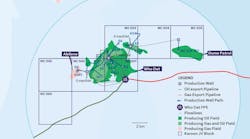Nina Howell, Jessica Trevellick
King & Spalding
The old adage “say what you mean, mean what you say” appears to be a good rule of thumb for offshore drilling contracts. In a recent case, the English court determined that the “commencement of drilling” meant the moment when the drill penetrates the sea bed, and did not extend to preparations for drilling. Companies engaged in offshore drilling activities under contracts governed by English law should therefore pay special attention to the choice of words in their agreements to avoid uncertainty.
In a dispute arising from a sale and purchase agreement for an interest under a production-sharing contract (PSC), the English court (Queen’s Bench Division of the High Court of Justice) was asked to consider the meaning of “commencement of drilling.” The crux of the matter was whether commencement had occurred when an agreement was made with a third party to supply the drilling rig, or when the drill actually broke through the seabed.
In the case of Vitol E&P v. Africa Oil and Gas Corp. [2016] EWHC 1677 (Comm), the two companies were in a PSC with the Republic of Congo. They had been granted a research permit for the Marine XI offshore area: this could be extended for up to three consecutive exploration periods on the condition that at least one “commitment well” was drilled in the area in the preceding exploration period.
A commitment well had been drilled within the second period and all parties agreed to apply to renew the permit for a third period. Some proposed drilling an additional “discretionary well,” which Vitol was opposed; however, the majority voted to include it in the budget for the second exploration period. When the discretionary well became a committed budgeted item, each PSC party was liable for a share of its cost, whether the well was completed within the second exploration period or not.
An outside company then offered to buy Vitol’s interest in the permit. Under the terms of the sale, the buyer would pay some consideration at the time of the transfer of shares, and then either (i) bear Vitol’s share of the costs of the discretionary well, or (ii) if this were removed from the budget, or if drilling had not commenced prior to the expiry of the second exploration period.
Africa Oil and Gas then decided to exercise its pre-emption right to purchase Vitol’s shares on the same terms as had been negotiated with the outside company. These included paying $12.6 million up front, and committing to cover either Vitol’s $7.2-million share of the costs of the discretionary well, or if the well were removed from the budget or drilling did not commence before the expiry of the second exploration period, a deferred consideration of $7.4 million. Meanwhile, the Congolese Minister for Hydrocarbons agreed to extend the second exploration period until June 30, 2013.
In April that year, a drilling rig became available. A letter of award was issued on May 14, and a contract pursuant to the letter was agreed to on May 22, under which the contractor was to transport the rig from Rio de Janeiro to the Republic of Congo. The rig arrived on July 3, 2013, and the discretionary well was spudded on July 20. Vitol then demanded the deferred consideration payment from AOGC, but the latter refused to pay on the grounds that commencement of drilling had occurred in May, before the expiry of the second exploration period. However, Vitol contended that the commencement of drilling did not occur until July 20, when the discretionary well was spudded.
The court determined that commencement of drilling meant the point when the discretionary well was spudded, which occurred after the expiry of the second exploration period, so Vitol was entitled to the deferred consideration payment.
The decision confirms the weight that the English courts attach to the natural meaning of words used in a contract. The court noted that there is a particular need for clarity and certainty where a substantial payment is at issue. Spudding is clear; it is the moment when the drill breaks the ground. Preparation for drilling, however, is not such a discrete concept; there is no clear limit as to what might or might not be considered a preparatory act, and opinion will differ on this point.
In adopting this pragmatic approach, the courts are encouraging parties to be careful with their choice of words so that the true nature of the agreement, and rights and obligations under it, are properly recorded. This helps to ensure that all parties to a contract understand what they are agreeing to from the outset, in turn reducing the likelihood of accidental breaches and/or disputes further down the line. Where possible, the use of simple and clear language is advisable, while the use of invented or unnecessarily complicated words or phrases which a party might use to try to obfuscate the true nature of the agreement (in order to extricate it from an obligation) should be avoided.
However, the courts will stray from the natural meaning if, for example, this gave rise to a commercially absurd and unworkable result, or would be manifestly unfair because it would deprive a party of a protection that it was clearly intended to have. However, in this case, adopting the natural meaning produced a reasonable outcome and the court therefore found no reason to depart from it.
AOGC cited some US cases (although these are not binding authority in the English courts) in which the words “commencement of operations for drilling” had been used. The US courts held that “operations for drilling” could be interpreted broadly enough to include preparatory acts, such as bringing timber to build a derrick on to the land. Alas, AOGC’s argument was unsuccessful.
The authors
Nina Howell is a counsel and Jessica Trevellick is a trainee solicitor in the London office of King & Spalding.




